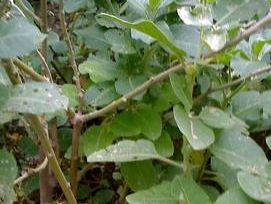 "Fit with Ashwagandha." That's the advertising promise, at least. Ashwangandha (Latin: Whitania somnifera) is an Asian berry plant said to be rich in vitamins and possess antioxidant and anti-inflammatory properties. The roots and leaves of the plant are used; the berries are considered poisonous. In men, the plant's active ingredients are said to increase testosterone levels and fertility. Ashwangandha has been traditionally used in Ayurveda (Indian medicine) for centuries. The plant is said to help promote mental balance and relaxation. It is a popular remedy for insomnia and anxiety.
"Fit with Ashwagandha." That's the advertising promise, at least. Ashwangandha (Latin: Whitania somnifera) is an Asian berry plant said to be rich in vitamins and possess antioxidant and anti-inflammatory properties. The roots and leaves of the plant are used; the berries are considered poisonous. In men, the plant's active ingredients are said to increase testosterone levels and fertility. Ashwangandha has been traditionally used in Ayurveda (Indian medicine) for centuries. The plant is said to help promote mental balance and relaxation. It is a popular remedy for insomnia and anxiety.
The claimed positive effects of Ashwangandha have not been fully scientifically proven internationally, and its health risks are poorly understood.
Market development and forecasts
Ashwagandha has been available on international markets for decades, primarily as tea, powder, and capsules, as well as preparations containing ashwagandha as a blend. The international product market is estimated at USD 766.24 million in 2024. The main consumers are in Asia. The product has experienced significant market expansion in recent years, with increasing sales figures worldwide. If international sales continue to rise at the rates of recent years, an international market size of USD 1.8 billion is expected by 2034. The growth rate is expected to be around 9% per year. According to market research reports, Europe will also experience increasing growth in this "miracle plant." Online retail is particularly credited with strong sales in this area.
The American market is dominated by the plant's root extracts. These are found in numerous blended products. This is said to be due to withanolides, a group of numerous chemical compounds. These are primarily attributed to the plant's anti-inflammatory effects. The USA, Canada, and Mexico are showing a consistent percentage increase in sales figures, according to Data Bridge Market Research. The annual and expected growth of the Ashwagandha market here is approximately 12% up to and including 2029, making it the fastest-growing market. North America has already experienced a significant increase in general health awareness.
Consumption warnings
According to the German Federal Institute for Risk Assessment (BfR), these herbal products should be avoided in cases of early liver damage or liver injury. Children, pregnant women, and breastfeeding women should avoid taking these herbal preparations! As early as 2012, the BfR warned that ashwagandha could affect thyroid function and that the plant was historically believed to have been used as an abortifacient.
---
BFR - Bundesinstitut für Risikobewertung: "Ashwagandha: Schlafbeeren-Präparate mit möglichen Gesundheitsrisiken" in der Mitteilung 39/2024 vom 10. September 2024
Precedence Research: Ashwagandha Market Size to Hit USD 1,864.51 million by 2034 [18.07.2025]
precedenceresearch-com/ashwagandha-market
